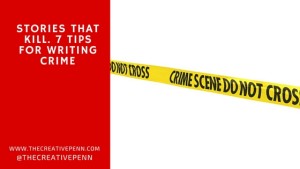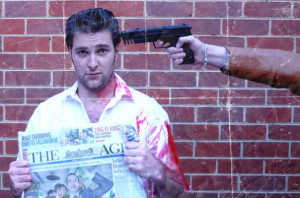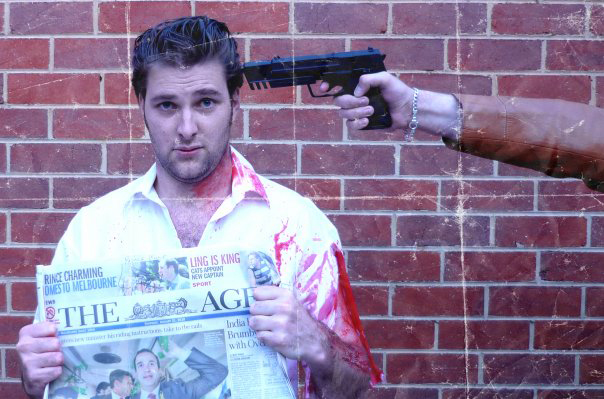OLD POST ALERT! This is an older post and although you might find some useful tips, any technical or publishing information is likely to be out of date. Please click on Start Here on the menu bar above to find links to my most useful articles, videos and podcast. Thanks and happy writing! – Joanna Penn
Writing crime is definitely a different kind of beast, as I found out when writing “Desecration” last year.
 Murder mystery takes intricate plotting, you need to set up multiple characters who might be responsible, and you need to have an original spin to stand out in this popular genre. In today's post, crime writer Luke Preston shares some of his tips.
Murder mystery takes intricate plotting, you need to set up multiple characters who might be responsible, and you need to have an original spin to stand out in this popular genre. In today's post, crime writer Luke Preston shares some of his tips.
If you want to write a crime novel, you’d better be ready to pick a fight. People are going to hate you and there’s nothing you can do about that.
They’re going to hate you for killing off their favorite characters, they’re going to lecture you for your use of bad language and they are going to resent you for taking them to places that challenge their values and beliefs. If you don’t like picking a fight, go write something else. But, if you like getting your knuckles bloody, you’ve come to the right place.
Writing is hard and finding your way through the words takes an immense amount of time. Here are 7 tips that I wish somebody had told me years before I put pen to paper.
(1) Don't be boring
The worst crime a writer can commit is to be boring. I’d rather do serious time for murder than to be accused of being boring. If a crime novel turns out to be boring there’s a very high chance it is because the writer was bored while penning the decaf infused words. The worst piece of advice I have ever heard, and it’s slapped around like a 12 step mantra is, ‘Write what you know.’ It’s bullshit, never write what you know, write what excites you. You do that and that excitement will come across on the page and excite the reader.
(2) Grab the reader by the throat on the first page and don't let go
In any story, the opening sentence, paragraph, page or chapter can be vital and crime writing is no exception. Start your story off like a shotgun blast in the middle of the night.
Here are a couple of opening types that have worked for me in the past.
The Action Opening: Start the novel with the hero in some sort of physical or emotional jeopardy
The Flashback Opening: Start with a moment of high drama from somewhere later in the novel and then flashback to the events leading up to it.
The First Day on the Job Opening: A good way to introduce the world to the reader is to discover it through the eyes of the hero. They may, as the title suggests, be starting a new job, or they may have just arrived in town.
The Everyday Hero Opening: Your protagonist is going about their everyday life and some event sends them spiraling off into another direction.
Outside Action: The outside action event could be a robbery, or a murder, or any problem that doesn’t involve the hero.
Never start with a description of the weather. In a crime novel, if you open with the description of the weather I’m going to think that the weather killed somebody.
(3) Have a crime
If you are writing a crime novel bad and awful things, sourced from the madness of your soul, need to happen. A crime novel without a crime isn’t a crime novel and a straight up murder isn’t going to cut it anymore. Give your criminals unique and conflicting reasons to be criminals. The bad guy in a story never knows he’s the bad guy. In his story, he’s the good guy. Your protagonist is only as strong as the forces of antagonism they are up against. Give them something to go up against.
*Note: A killer never kills because they are mad, there is always a reason.
(4) Don't write likeable characters
Nobody likes likable characters. They may think they do and they may believe they do, but they really don’t. What they like are interesting characters. Characters that make mistakes, characters that think fast and think badly, flawed characters, but likeable characters. Likeable is boring. Crime novels are littered with sons of bitches, wild men, dubious women and double crossing bastards. Given the questionable nature of the characters that populate the pages of a crime novel, the question is how do you capture the hearts of the readers and keep them turning the page?
The answer is empathy.
Empathy is different from likable. Even the most renegade of criminal will detest a serial killer. But we are more than happy to read pages and pages of a serial killer roaming the streets of Florida murdering away for pleasure and work as Dexter does in Jeff Lindsey’s series. Readers don’t turn those pages because they like Dexter or believe in his cause. They do because they empathize with Dexter – he’s a guy who just wants to fit in.
Here are a couple of ways to create empathy.
- Make the hero funny
- Make the hero a victim
- Show the hero in a dilemma
- Show the hero being highly skilled
- Show the hero being selfless
(5) Endings that slap you in the face
A killer ending us just as important as a killer opening. The reader has been good enough to purchase your novel and read it all the way to the final pages so give them an ending that will knock them on their ass (and send them straight out to buy your next novel).
Great endings give the reader what they want but not in the way they expect it. It reads easy but it’s not. Think of the ending as a mini three-act structure with twists and turns, reversals, setbacks and new plans. And when you’re story is over, end it! That guy in the first act who had the really cool car and said those three cool lines of dialogue; to the hell with him — we don’t care where he ended up. As ‘B’ movie king, Roger Corman once said, when the monster is dead, the movie is over.
(6) Get into a fight
Get out of the office, hit the street and start a fight. I don’t care with who. I don’t care what about. You can’t expect to be a writer without getting out into the world and getting your heart and knuckles scraped. Don’t hide in the world, be a part of it, experience its disappointments and triumphs, anger and heartbreaks and put it all on the page.
(7) What the hell is your story about?
Well, what the hell is your story about?
This is the question you need to ask yourself every single day that you follow one word with another on the way to the final last few. I’m not talking about the high concept idea you pitch at parties where you say your novel is about a guy, from wherever, who does this, and that happens. I’m talking about what your story is about on a thematic level. What does it mean to you? What are you saying about the world with your story? What the hell is it really about?
It’s that hidden drive, buried deep in your sub-conscious that pushes you to get up early and stay up late pounding out the words at the typer. Some of us write out of anger, and some of us write out of sadness. The only way to define what it is you are really writing is to sit in that familiar position of pen in hand and write down a list:
Ten things that make you angry
Ten things that make you sad
Think about what relates to you most and give that trait to your protagonist. Bruce Wayne isn’t angry that his parents were murdered (although I’m sure that pissed him off) what really drives Bruce Wayne is that he is angry that people are not held responsible for their actions. Therefore, he becomes a vigilante. That is what is really at the heart of Batman. And whether you know it or not, there is something at the heart of your story and if you can define it, you can develop and explore it with a master’s control.
What I’ve been writing about here are only a few things that have helped me over my years in the war of the words, take what you can from it, and discard what you will. The words come differently to everyone. Sometimes fast, sometimes slow and sometimes not at all. In those times of darkness and empty pages remember that, if you wait, if you are patient, the words will always come.
Do you write crime? Or love reading crime? Please share your comments and tips below.
 Luke Preston spent most of his twenties as a freelance writer, a private investigator and listening to rock ‘n roll. He is the author of the Tom Bishop Rampages, Dark City Blue and its sequel, Out of Exile, which can be found here.
Luke Preston spent most of his twenties as a freelance writer, a private investigator and listening to rock ‘n roll. He is the author of the Tom Bishop Rampages, Dark City Blue and its sequel, Out of Exile, which can be found here.
Luke’s writing is as much influenced by AC/DC and Johnny Cash as it is by Richard Stark and Raymond Chandler. He holds a Master's degree in Screenwriting from the Victorian College of the Arts and has absolutely no intention of moving to a shack in the middle of nowhere. He likes bad traffic, noisy neighbors, cheap beer, loud bars and has been occasionally known to howl at the moon. Luke’s work has been recognized by The Inside Film Awards, MTV and The ATOM Awards.



I love your tips! I’m ready to write!
Thank you for your ideas, I never wrote before but I want to do something different and maybe start to write a crime/mystery story.
I have never laughed so many times while reading a writing article. This is such a wonderful, well-written, fresh take on writing.